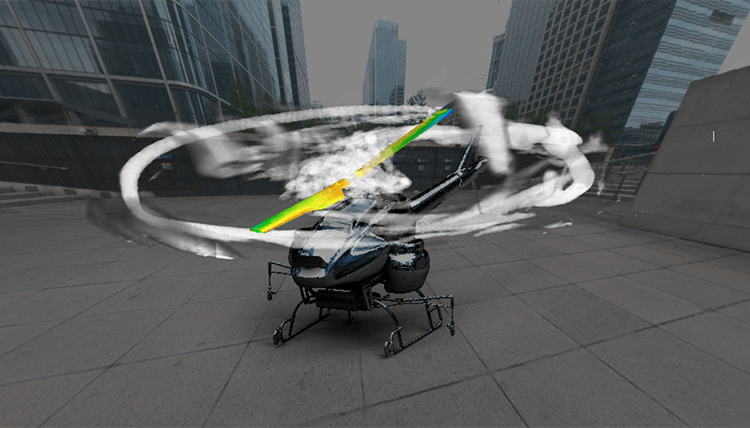Hexagon: Yamaha Motor Wins award for multi-physics unmanned helicopter noise simulation
Hexagon’s Manufacturing Intelligence division announced today that Yamaha Motor Co. has been named the first-place winner of its 2021 MSC Nastran Excellence Award, which recognizes the engineering and design innovation of MSC Nastran users globally. While submissions worldwide highlight the impact of MSC Nastran structural simulation software in a range of design, engineering, and manufacturing applications, Yamaha Motor is recognized for innovatively using a combination of fluid, structural, and acoustics co-simulation tools to successfully mitigate noise generated by unmanned helicopters.
Widely used and trusted for its strength in highly accurate finite element analysis (FEA), MSC Nastran has been the industry standard for structural simulation since NASA’s Apollo missions. The robust software is used in virtually every sector, which is reflected in the diversity of the 2021 award nominees. From the simulation of models of eVTOL aircraft to the multi-scale analysis of fabric-covered wind turbine components and many more, each application was reviewed by a panel of experts comprising technical, product and marketing representatives from Hexagon’s Centre of Excellence for Structures Computer-Aided Engineering (CAE).
Yamaha Motor was awarded first place for its creative use of MSC Nastran during the design and development of unmanned helicopters intended for use in residential areas. The incorporation of fluid-structure-acoustics co-simulation practices in the company’s design workflows provided insights that enabled it to further reduce noise generated during operation. The multi-physics analyses enabled by combining MSC Nastran, Cradle CFD, and Actran acoustic simulation opened up new opportunities to innovate, allowing Yamaha Motor to develop different business scenarios for unmanned helicopters and address them throughout the design to downstream engineering processes.
Mr. Mizuno of the Robotics Division at Yamaha Motor said: “The visualization of sound, which is invisible, has a great impact on the design development of an unmanned helicopter. We expect that effective co-simulation of fluid analysis and structural analysis will contribute to the development of high-performance tailor-made main rotors optimized for industrial applications and daily usage.”
Japan has led in the development and use of unmanned helicopters, notably in agriculture, with Yamaha Motor Co., Ltd. first launching its flagship RMAX unmanned helicopter in the early 1990s. Since then, Yamaha Motor has continued to build on and improve its original designs to optimize the use of unmanned helicopters in different environments.
Although the aircraft is operated remotely, their noise can lead to operator fatigue. Mizuno explained: “For agricultural use, we have to reduce the noise that unmanned helicopters make because they will fly over a field around a residential area. Noise reduction also helps reduce operator fatigue. Up until now, we have achieved engine noise reduction mainly by adopting four-stroke engines. However, we now want to go further and reduce the noise caused by the main rotor.”
Noise pollution is considered to be a major factor in social, environmental, and manufacturing sustainability. As our cities and industrial facilities grow in size and complexity the mitigation of noise pollution, which has major adverse biodiversity impacts globally, is increasingly critical to the quality of life. MSC Nastran plays a significant role in improving the acoustic performance of automobiles, airplanes, and other adverse noise sources to help build a more quiet, pleasant, and sustainable environment.
Ford Motor Corp. and Data were runners-up for the 2021 MSC Nastran Excellence Award are, having exemplified extensive and innovative use of MSC Nastran.
Dr. Philipp Roemelt of Ford Motor Corp. was awarded the prize for designing a highly efficient fatigue test for commercial vehicle roof racks using surrogate load modeling in MSC Nastran, commenting: “With the advent of new mobility concepts like ride-sharing and autonomy, the durability of a vehicle will play an ever more important role. Leveraging the latest in CAE technologies, Hexagon products like MSC Nastran and CAEFatigue help us design durable vehicles in a timely and cost-efficient manner.”
Dr. Olivia Stodieck of Dapta was awarded the prize for creating a multi-disciplinary study approach to tailor the aeroelasticity of Steered Fibre Wings, which are used to reduce the mass of modern aircraft structures for green aviation. This new approach allows for the development of sustainable high-performance products, faster and more efficiently.
Keith Hanna, VP Marketing – Design and Engineering at Hexagon commented: “It’s clear from the diversity and superior quality of the submissions we received for the second annual Nastran Excellence Award that MSC Nastran continues to provide the strong foundation needed for our users to develop and ultimately realize their cutting-edge designs. We continue to be inspired by the ground-breaking applications of imaginative users who embrace technology to delve fearlessly and enthusiastically into new frontiers of development.”
Mr. Mizuno has decided to donate the award prize through the Yamaha Motors Nice Ride Fund that donates funds for the development of the Japan Guide Dog Association that helps reduce the wait times for those seeking guide dogs.
Yamaha Motor joins 2020 winner Volvo Cars. Details of the next annual MSC Nastran Excellence Award will be announced in Spring 2022.
This content was originally published on the Hexagon MI website.

